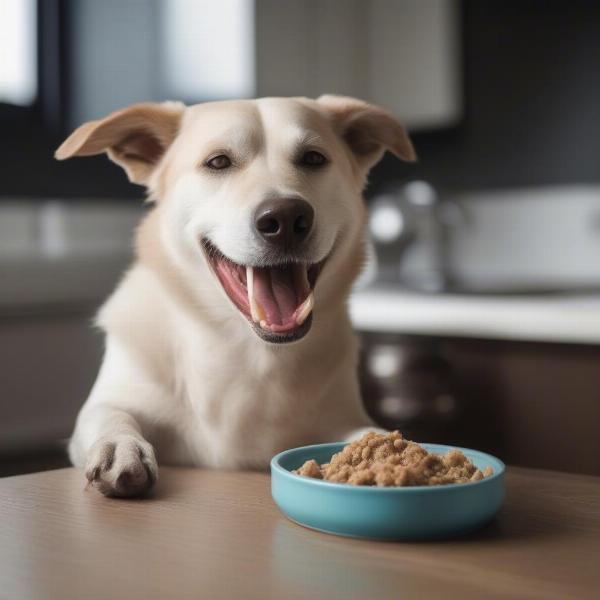Senior dogs often require specific dietary adjustments to accommodate their changing needs. Soft food for older dogs can be a great option to address these changes, promoting better health, easier digestion, and improved quality of life. This guide explores the benefits, considerations, and best practices for feeding your aging companion soft food.
Why Choose Soft Food for Senior Dogs?
As dogs age, they may experience dental issues, decreased appetite, and difficulty chewing kibble. Soft food offers a palatable and easily digestible alternative, ensuring they receive the necessary nutrients without struggling to eat.  Soft food helps older dogs with dental issues eat more comfortably. Soft food can also be more appealing to picky eaters, encouraging them to consume a sufficient amount of calories and essential nutrients. Additionally, many soft foods are formulated with added joint support supplements, such as glucosamine and chondroitin, which are beneficial for older dogs prone to arthritis and joint pain.
Soft food helps older dogs with dental issues eat more comfortably. Soft food can also be more appealing to picky eaters, encouraging them to consume a sufficient amount of calories and essential nutrients. Additionally, many soft foods are formulated with added joint support supplements, such as glucosamine and chondroitin, which are beneficial for older dogs prone to arthritis and joint pain.
Selecting the Right Soft Food
Choosing the right soft food for your senior dog involves careful consideration of their individual needs. Look for foods that are specifically formulated for senior dogs, as these will have adjusted levels of protein, fat, and fiber to support their age-related requirements. Pay attention to the ingredient list, prioritizing high-quality protein sources, whole grains, and healthy fats. Avoid foods containing artificial flavors, colors, and preservatives. Your veterinarian can help you determine the ideal calorie intake and nutrient profile for your dog based on their breed, size, activity level, and any underlying health conditions.
Transitioning to Soft Food
If your older dog is accustomed to eating kibble, transitioning to soft food should be done gradually to avoid digestive upset. Start by mixing a small amount of soft food with their regular kibble, gradually increasing the proportion of soft food over several days. oldies but goodies dog rescue This allows their digestive system to adjust to the change in texture and consistency. Monitor their stool for any signs of diarrhea or constipation and adjust the transition speed accordingly.
Addressing Common Concerns
Is soft food bad for my senior dog’s teeth?
While soft food may not provide the same abrasive cleaning action as kibble, proper dental hygiene practices can still prevent dental disease. Regular brushing, dental chews, and professional cleanings are crucial for maintaining your senior dog’s oral health.
Can I mix soft and dry food for my older dog?
Mixing soft and dry food can be a viable option for senior dogs, providing both palatability and some dental benefits. However, ensure that the combined diet is nutritionally balanced and meets your dog’s specific needs.
How much soft food should I feed my senior dog?
The appropriate amount of soft food will depend on your dog’s individual needs, including their size, breed, activity level, and any underlying health conditions. Consult your veterinarian or refer to the feeding guidelines on the product packaging for specific recommendations. gifts for dogs for christmas
Homemade Soft Food Options
For owners who prefer homemade diets, consulting a veterinary nutritionist is crucial to ensure a balanced and complete nutritional profile for your senior dog. waterproof crate mats for dogs They can help you create recipes that meet your dog’s specific needs and avoid nutritional deficiencies. rear leg weakness in dogs
Conclusion
Soft food can be an excellent choice for older dogs, offering numerous benefits for their health, digestion, and overall well-being. By carefully selecting the right soft food, transitioning appropriately, and maintaining good dental hygiene, you can ensure your senior companion enjoys a healthy and comfortable diet in their golden years. Consider your dog’s individual needs and consult your veterinarian for personalized advice. senior dry dog food
FAQ
- How can I encourage my senior dog to eat soft food? Try warming the food slightly or adding a small amount of low-sodium chicken broth to enhance its palatability.
- What are the signs of dental problems in senior dogs? Bad breath, excessive drooling, difficulty chewing, and reluctance to eat are common signs.
- Are there specific nutrients that senior dogs need more of? Senior dogs may benefit from increased levels of antioxidants, omega-3 fatty acids, and joint support supplements.
- Can soft food help with weight management in senior dogs? Some soft foods are formulated for weight management, with lower calorie density and added fiber.
- Should I avoid certain ingredients in soft food for senior dogs? Artificial flavors, colors, and preservatives should be avoided.
- How often should I feed my senior dog soft food? Most senior dogs benefit from two to three smaller meals per day.
- Can I give my senior dog treats with soft food? Treats are fine in moderation, but factor them into your dog’s overall calorie intake.
ILM Dog is your trusted source for expert advice on all aspects of dog care, from breed selection and puppy care to senior dog health and nutrition. We offer practical tips and guidance to help you provide the best possible care for your canine companion. Contact us today for more personalized advice! Email: [email protected] Phone: +44 20-3965-8624. Visit ILM Dog for more information on dog health, nutrition, and wellbeing.